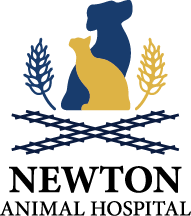Library
-
Hypokalemia is a term that refers to a low blood concentration of potassium. Potassium is an important electrolyte within the body and is vital for the normal function of muscles and nerves. Mild to moderate hypokalemia often does not cause clinical sigs, but severe hypokalemia can result in generalized muscle weakness, lack of appetite, and some cats may become constipated. The underlying cause of hypokalemia is often chronic kidney failure. Hypokalemia and its associated clinical signs may be quickly corrected by potassium supplementation. Depending on the cause, it may be necessary to continue supplementing potassium permanently.
-
Ichthyosis is a rare skin disease in dogs and is sometimes also referred to as "fish scale disease". It generally causes the skin to appear rough and covered with thick, greasy flakes. It is the result of a genetic mutation and certain breeds, listed in this handout, seem to be affected more than others.
-
Icterus is also known as jaundice. It is an excessive accumulation of a yellow pigment called bilirubin in the blood and tissues, most easily seen in the gums and whites of the eyes. Icterus can be caused by hemolysis, liver disease, or obstruction of the bile duct. Your veterinarian will perform screening tests to determine the root cause of icterus.
-
Imidocarb dipropionate is an injectable medication that is administered by a veterinarian to treat babesiosis in dogs. It is also used off-label to treat other protozoal infections in dogs, cats, and horses. Most common side effects include mild drooling, tearing, vomiting, or nasal drip. Do not use in pets with exposure to cholinesterase-inhibiting drugs, pesticides, or chemicals. If a negative reaction occurs, please call your veterinary office.
-
Inappropriate elimination generally refers to urination and/or defecation in places other than the litter box. The behavior is sometimes referred to as ‘house soiling’. Inappropriate elimination may be due to a medical condition, a behavioral disorder, or both. Treatment is very specific to the underlying cause.
-
Infectious canine hepatitis (ICH) is a viral infection caused by a member of the adenovirus family. Young dogs are at the highest risk of contracting this virus and signs of disease usually occur within two to five days after exposure. In severe cases, usually in young puppies, along with the fever, depression, and loss of appetite, there is abdominal pain, vomiting, diarrhea, edema (fluid swelling under the skin) of the head and neck, and possibly jaundice. Such cases are often fatal. Treatment is aimed at reducing symptoms and giving time for the dog's immune system to respond, including hospitalization, intravenous fluids, and medications. Vaccination has been very successful at reducing the prevalence of this disease.
-
Infertility in a queen (an intact female cat) is defined as the inability to give birth to live kittens, despite appropriate breeding with a fertile male. This handout provides an outline of common causes of infertility along with how they are diagnosed and, when possible, treated.
-
Infertility in a female dog is defined as the inability to conceive and deliver viable puppies, even when mated multiple times with a known fertile male surrounding the time of ovulation. This handout outlines the varying causes of infertility in female dogs and how they may be diagnosed and treated.
-
Inflammatory bowel disease (IBD) is a syndrome affecting the stomach and/or intestines that can cause vomiting, diarrhea, or weight loss. It is considered a chronic condition that may have a good prognosis, though a diagnosis is not always easy. Treatment may involve a diet change, medications, or both and will need to be closely followed to prevent relapses.
-
Inflammatory bowel disease (IBD) is a syndrome affecting the stomach and/or intestines that can cause vomiting, diarrhea, and weight loss. It is considered a chronic condition that may have a good prognosis, though the diagnosis is not always easy. Treatment may involve a diet change, medications, or both and will need to be closely followed to prevent relapses.


